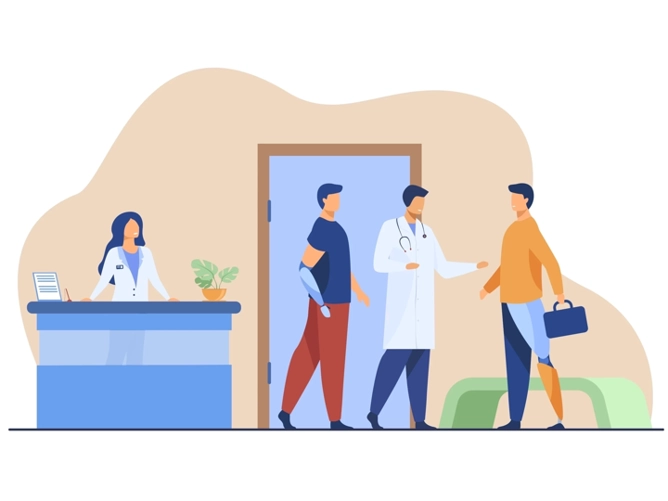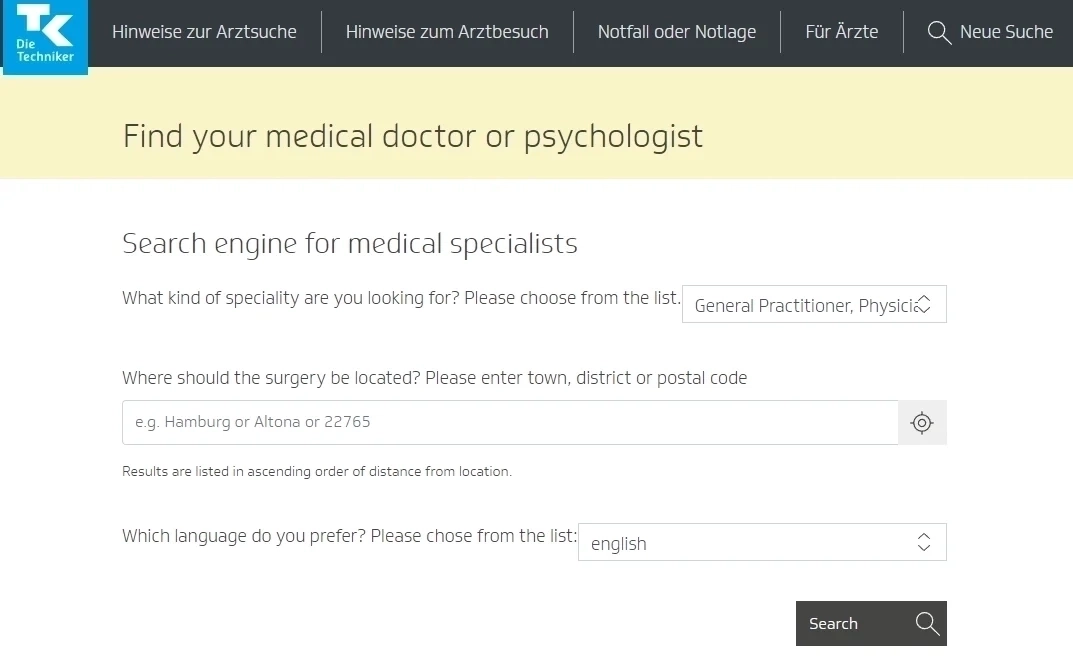
Visiting a Doctor In Germany [2025 Guide] - Live In Germany
During winters, having fever or flu is almost impossible to avoid. Visiting a doctor in Germany does give us a dreadful feeling since it may incur a heavy cost but for students, health insurance is mandatory. So you don’t have to worry a lot when visiting a doctor in Germany. First of all, we do hope you are going through this article just out of curiosity and you are not ill. But if you are, first let us tell you Gute Besserung! :). This is what German people say for “Hope you get better”.
Top 6 Things to Know When Visiting a Doctor in Germany
Whether you are an expat living in Germany or have a permit particularly for medical needs, the health care system of Germany is very different as compared to other countries. But if planned carefully, you can end up having a positive experience.
Patients Can Expect High Quality Care
If you have done thorough research before visiting a doctor in Germany, it can allow you to receive a low-stress and worry-free experience.
Quality Medical Treatment is Priority
Hospitals in Germany are focused on offering the best possible care to their patients rather than providing a luxurious experience. Due to this, the privacy and comfort level is not something patients are easy with.
German Doctors are Honest
Due to strict laws, patients can be assured at all times when visiting a doctor in Germany. They will be treated honestly and with transparency. Similarly, doctors share the truth with their patients. In case a family wants to keep the severity of illness secret from their patient, a German doctor will never keep it hidden and tell the patient the truth.
German Doctors Ask a Lot of Questions
To ensure best treatment, German doctors require a whole lot of information from their patients. They inquire in detail about the medical history of the patient.
German Doctors Provide Patients with Detailed Information
Doctors in Germany are legally bound to brief patients about their health or treatment. Before going through a treatment, a consent form is signed by the patient and they also get the chance to inquire about treatment if needed.
German Hospitals are All About Efficiency
The country has always been famous for doing stuff in an efficient manner. The prime objective of German hospitals is to ensure that patients are getting effective and on-time treatment.
Who Can Access Doctors in Germany?
Visiting a doctor in Germany is not possible without having health insurance. For Germans, it is illegal to remain uninsured. Due to this, doctors ask for payment in advance in case a patient is uninsured.
The requirement of health insurance also applies to non-residents and visitors. For people visiting from the EU and Switzerland, they can use their EHIC (European Health Insurance Card). But that card too will cover only the emergency instances and minor medical concerns.
How To Find a Doctor in Germany
The process of choosing a doctor for yourself is quite hectic due to language barrier. This decision is both difficult and important but it’s not that tricky. You can simply go search yellow pages (Gelbe Seiten). You will find a list of doctors according to their specialties. Friends or colleagues can also be asked to help you out. There are many websites as well who have listed multiple doctors depending upon their location and specialty. One of those websites in English language is www.med-kolleg.de.
At the doctor, you might need some for question asking. For this, you can take along a supportive friend who is fluent in German. An English-German dictionary can also help you out in this scenario.
There are a variety of doctors in the health care system of Germany. It is recommended to get yourself a general practitioner (Allgemeinarzt). Nothing to worry about if you are a non-German speaker. You can simply head on to google and search for “Allgemeinarzt Englisch + your city”.
There are multiple health platforms present online which can help you out as well. Doctena and Zava are one of those platforms that connect patients with doctors.
The general doctor/practitioner is going to be your first point of contact in case you get ill. Reporting to your doctor is an important thing to do. Because if you cannot go to work, your doctor will provide you with a ‘Krankheitsbescheinigung’ (illness confirmation). you will only get this after the doctor has confirmed your illness. You will have to share the confirmation with your employer.
English Speaking Doctors
Surprisingly, in major cities, you will find most of the doctors that are able to speak basic English. You can also consult with your English-speaking friends or make use of online forums. The Irish embassy has created a list of English-speaking doctors. Similarly, the US consulate has also processed a list featuring doctors in Berlin, Frankfurt and other major cities.
You can also take assistance from Die Techniker’s online search tool to search a good English-speaking doctor.

For small towns and rural areas, it is not guaranteed that you’ll find an English-speaking doctor. Therefore, it is recommended you take along a translator for an appointment.
Registering with a Doctor in Germany
It is your free choice to select from the available doctors like general physicians, pediatricians etc. you can see different doctors throughout the year rather than sticking with one. If you are not satisfied with one doctor, you can change. But keeping a single doctor is beneficial as they get to know you well with time. Since they’ll be having a medical history of yours, it will be easier for them to help you out.
What to Expect when Visiting a Doctor in Germany
You will first have to show your health insurance card Krankenversicherungskarte when you are visiting a doctor in Germany. For first timers, they will have to fill up some paperwork as well. There are waiting times too, depending on type of practitioner, time of visit and doctor’s count. You can contact before coming to know the expected time of waiting.
The receptionist usually takes you to the consultation room. For routine checkup, doctors examine and explain if something’s wrong. In Germany, doctors are rather direct and avoid wasting patients’ time by making conversations. It is advised to prepare yourself with questions if you have any. Doctors also offer online service, covered by your insurance. They can also be dispatched for emergency visits, but occasionally. The on-call medical service can also be contacted on 116117.
Making An Appointment
Before visiting a doctor, you will have to make an appointment. This can be done over telephone and also by going in person. The person you will come across is the Arzthelfer or doctor’s assistant. They might not ask you many questions about why you are visiting a doctor. Normally for an appointment, you have to request a day and time. If the purpose of the visit is extraordinary, you will have to specify the reason. Or else, you can share your medical history later.
Below are some useful phrases that can help you in appointment:
- Ich möchte einen Termin machen: This means “I would like to make an appointment
- Es ist dringend. Haben Sie keinen früheren Termin? It is urgent. Don’t you have an earlier appointment?
Office Hours
In Germany, doctors are commonly part of hospital staff and also keep private practice. Due to which, office hours (Sprechstunden) are limited. The doctors who are doing private practice, normally have office hours of 8am to 1pm and 3pm to 6pm. Wednesdays are an exception since most of the doctors are closed that day.
Even if you have made an appointment, several doctors see patients on a first come first serve basis. Hausarzt (General Practitioner or Primary Care Physician) has an open door policy but still having an appointment is suggested.
Outside Office Hours
In case you require urgent medical assistance, there are always doctors available who are working during weekends and holidays. You can get help after-hours from these doctors.
You can find the emergency doctors in your local newspaper. Look for the heading of Notdienst Kalender which means emergency calendar. Under this heading, you will find the list of after-hour doctors (Arzte), Pharmacies (Apotheke) and ambulance service (Krankentransporte).
Medical Specialists in Germany
Specialist care is available for all residents of Germany. Patients can either call directly to practice or they can go online to make an appointment. At times, you may require a referral to visit a specialist. Waiting lists do vary in this category. It depends on the urgency and availability. So you might be able to visit a specialist within a space of one week or you might have to wait for months.
Finding a Specialist in Germany
Going to a specialist is almost the same as going to a general doctor. You can search for them on online platforms like Doctolib, KBV and Jameda. You can also seek help from expat groups of English speakers. Embassy listings of US consulate can also be seen as mentioned before.
Private Doctors and Specialists in Germany
In the health care system of Germany, there are many private doctors. Some of these doctors only see patients who are insured privately. Because of that, patients having public insurance are unable to see these doctors. Similarly, expats select private doctors as they have short waiting times. They also provide multiple options in medicines that are usually covered under private insurance.
The search tool of the Federal Association of Private Doctors (Privatärztlicher Bundesverband – PBV) can be accessed for finding private doctors.
Rehabilitation centers and private hospitals are also present in Germany. But this will be quite confusing as private hospitals and clinics do see patients with public insurance. The best way is to reach out to the facility directly for inquiry.
Curious About Health Insurance Options?
Check out our detailed article on Public vs. Private Health Insurance in Germany.
Cost of Visiting Doctors and Specialists in Germany
Doctor visits in Germany are covered by health insurance. This includes annual checkups and pediatric examinations. Urgent medical care is also part of your health insurance. For an uninsured visitor, they would be required to pay in advance for treatment.
Though, there are some services in healthcare that are not covered under health insurance. This includes a hearing test, HPV test and toxoplasmosis test (required during pregnancy).
Doctors Prescriptions
Doctors do prescribe required medication to their patients. But on the other hand, they also try to look for solutions that don’t need a prescription. Antibiotics are usually not prescribed. Here, doctors at times suggest home and herbal treatments too. A paper prescription (Rezept) is written by doctors. Starting from 2022, electronic prescriptions (E-Rezept) are being provided to patients. The prescriptions are then taken to the pharmacy (Apotheke).
Medicines can be purchased over-the-counter (OTC) like aspirin, paracetamol or cough syrup without a prescription but these are out-of-pocket costs. Also, these medicines will cost less than €2 for a pack.

Visiting a Dentist in Germany
When you visit a dentist, there are a few things you need to know. It doesn’t matter if you have private insurance or public insurance, not all the dental treatments are covered in your insurance. For those Dental treatments, you need extra Dental insurance (Zahn Zusatzversicherung)
Searching for the Best Dental Insurance?
Check out our detailed article on Best Dental Insurance in Germany.
Medical Tests in Germany
In Germany, medical testing is different from other countries. In the US for instance, a blood check for anemia is a standard for infants. But in Germany, it is not recommended until there are potential concerns regarding anemia.
This is how it works in Germany. If the doctor requires, they can do several medical tests such as blood tests, urine sampling, ultrasound. If a patient wants further testing, they might have to self-advocate. In this case, insurance won’t be fully covered.
Test results are usually available online. In some instances, results are provided immediately after the process.
What is a ‘Gesundheitskarte’ and how to get it
The health insurance card in Germany is called Gesundheitskarte. It is a document that confirms you have health insurance. You should always carry it with you. When you visit a doctor or go to a hospital, they always ask to see your health insurance card.
Having health insurance in Germany is a must. Around 85 percent of Germans are part of public health insurance. The remaining 15 percent have private insurance.
What is Paid Sick Leave in Germany?
For those who acquire public health insurance, their company will pay them a six-week full salary. Sick pay can be obtained only if your doctor has confirmed your illness i.e., Krankenbescheinigung. You must also keep in contact with your company during the time you are sick. After the period of six weeks, sick pay will be provided to you.
In case you are self-employed, things aren’t the same. In this instance, you can only get sick pay if you have private health insurance.
Source: Doctor and patient vector created by pch.vector – www.freepik.com

Jibran Shahid
Hi, I am Jibran, your fellow expat living in Germany since 2014. With over 10 years of personal and professional experience navigating life as a foreigner, I am dedicated to providing well-researched and practical guides to help you settle and thrive in Germany. Whether you are looking for advice on bureaucracy, accommodation, jobs, or cultural integration, I have got you covered with tips and insights tailored specifically for expats. Join me on my journey as I share valuable information to make your life in Germany easier and more enjoyable.





